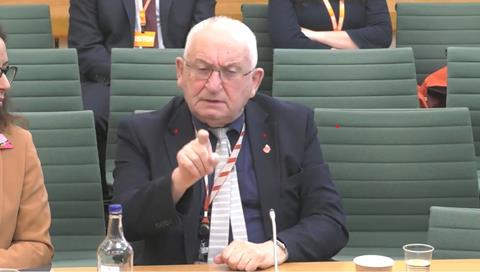Lord John Bird says that until government spends money on prevention “we’re screwed” before walking out of rough sleeping inquiry session
Governments have focused too heavily on emergencies and responding to homelessness rather than funding prevention, Lord John Bird has said.

In the first evidence session of the cross-party Housing, Communities, and Local Government committee’s inquiry into the causes of rough sleeping, the founder of the Big Issue told MPs that until the government focuses on funding homelessness prevention, ”we are going to be treading water”.
Bird said that the government “is looking at the problem when it becomes a problem”, adding that “Parliament […] and the Treasury [are] no good at preventing the problem”.
He walked out of the hearing a few minutes before the session he was speaking on was due to end.
He said: ”I don’t want to be a part of a farce. Until we start turning the tap off, we’re screwed.”
Government figures show there were 3,898 people sleeping rough in England on a single night in autumn 2023, up from 3,069 in autumn 2022 and 1,768 in 2010.
The select commitee, chaired by Florence Eshalomi, is examining the factors contributing to the rising numbers of people rough sleeping, and exploring potential solutions, including the Housing First model.
Another panellist giving evidence at the inquiry, Dr Carin Tunaker, a professor of law at the University of Kent, stated that “what we have is law, policy and practical solutions that are not really equipped to recognise the compounding effects of multiple forms of social disadvantage.”
She said a lack of cross-sector working, underfunding of social care, a shortage of affordable housing, and discrimination in the private rented sector are key issues exacerbating homelessness.
In addition, Tunaker pointed out that local housing allowance rates, the maximum amount of housing benefit people renting in the private sector can receive, do not cover rents.
>> See also: Homelessness charities warn national insurance changes could take £60m away from frontline services
>> See also: Ombudsman warns sector after issuing 10 landlords with multiple complaint failure orders in first quarter
Alicia Walker, assistant director of activism and advocacy at Shelter, said the escalating cost of living and the failure of new home construction to keep up with demand as key issues.
She said: “We say why has rough sleeping escalated but where are these people supposed to go if the homes don’t exist?”.
Balbir Chatrik, director of policy and prevention at Centrepoint, spoke about the barriers facing young people accessing homelessness services.
“They don’t even get to talk to somebody in the local authority. You would be surprised that local authorities don’t advertise the numbers for their housing options teams,” Chatrik told the committee.
Paul Dennett, deputy mayor at the Greater Manchester Combined Authority, said that cross-departmental working is where solutions to homelessness are to be found.
Dennett stated that the issue extends beyond the Ministry for Housing, Communities and Local Government (MHCLG), it also involves the Home Office and the actions of the Department for Work and Pensions on welfare reform over the past 14 years.
He also suggested that the government’s English Devolution Bill could offer solutions to the crisis, emphasising that local government and people working at a community and neighbourhood level are “best placed” to address homelessness.
Adam Hug, leader of Westminster Council said Westminster’s housing target has quadrupled under Labour’s new mandatory housing targets, but stressed that building in inner urban areas is challenging for councils due to the lack of available brownfield sites.
Hug added that if Westminster Council’s target goes up to 4,000 new homes a year, which it will under the current formula, “I need to have a conversation that people stop building offices because at the moment the private sector just wants to build offices”.
In August, the deputy prime miniser and housing secretary Angela Rayner announced that she will lead a new cross-government taskforce to reduce the “shameful, record levels” of homelessness in the country.










No comments yet